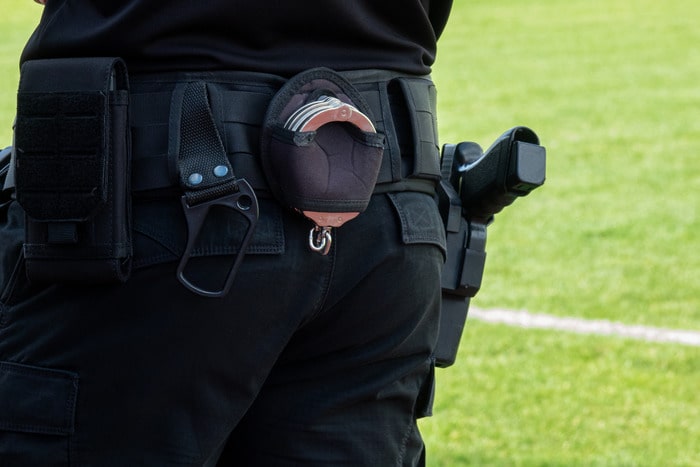
- September 25, 2023
- |security guard company
- | 0
- 372
Defending with Rights –
Security guards play a crucial role in safeguarding educational institutions, ensuring the safety of students, staff, and property. Just like any other employees, school security guards have specific legal rights and protections in the workplace. These rights are essential to ensure fair treatment, safe working conditions, and the ability to carry out their duties effectively.
In this article, we will explore the legal rights of school security guards in the workplace, focusing on their rights to a safe environment, fair compensation, collective bargaining, and protection against discrimination. At XPressGuards, a school security guard company, we are committed to upholding the rights and well-being of our security personnel.
The Role of School Security Guards
School security guards have a multifaceted role in educational institutions. Their responsibilities include:
1. Safety and Security: Ensuring the safety and security of students, staff, and visitors within the school premises.
2. Access Control: Managing entry and exit points, verifying credentials, and preventing unauthorized access to the school.
3. Emergency Response: Responding promptly and effectively to emergencies, including lockdowns, medical situations, and security breaches.
4. Surveillance: Monitoring security cameras, conducting regular patrols, and reporting any suspicious activities or incidents.
5. Conflict Resolution: De-escalating conflicts and confrontations among students or visitors to maintain a peaceful environment.
Legal Rights of School Security Guards
1. Right to a Safe Workplace:
– OSHA Compliance: School security guards have the right to work in an environment that complies with the Occupational Safety and Health Administration (OSHA) standards. Employers are required to provide a safe and healthy workplace, including appropriate safety training, equipment, and protocols.
– Workplace Violence Prevention: Guards are entitled to protection from workplace violence. Schools should have policies and procedures in place to prevent violence and respond effectively in case of security threats.
2. Right to Fair Compensation:
– Minimum Wage and Overtime: Security guards are entitled to receive at least the federal or state minimum wage, whichever is higher, and overtime pay for hours worked beyond the standard 40-hour workweek.
– Meal and Rest Breaks: Depending on state labor laws, security guards have the right to meal and rest breaks during their shifts. Employers must comply with these laws.
3. Right to Collective Bargaining:
– Union Representation: Security guards have the right to join or form labor unions to collectively bargain for better wages, working conditions, and benefits.
– Protection from Retaliation: Employers are prohibited from retaliating against security guards who exercise their right to unionize or engage in union activities.
4. Protection Against Discrimination:
– Equal Employment Opportunity: Security guards have the right to be free from discrimination based on race, color, religion, sex, national origin, age, disability, or genetic information, in accordance with federal anti-discrimination laws such as Title VII of the Civil Rights Act.
– Retaliation Protection: Guards are protected from retaliation for reporting workplace discrimination or harassment or for participating in investigations related to such claims.
5. Right to Privacy:
– Search and Seizure: Security guards have the right to privacy in their personal belongings and possessions, and their personal space should not be subject to unreasonable search and seizure by their employer.
– Surveillance: Employers may install surveillance cameras in public areas, but guards have a right to privacy in restrooms, locker rooms, and other private spaces.
6. Right to a Safe and Healthy Work Environment:
– Whistleblower Protection: Security guards who report violations of workplace safety or other legal requirements are protected from retaliation. Whistleblower laws shield employees from adverse actions by their employer for reporting such violations.
– Hazard Communication: Employers are required to inform security guards about any hazardous materials they may encounter in the workplace and provide training on how to handle them safely.
Additional Considerations for School Security Guards
1. Training and Certification: School security guards should receive appropriate training and certification to perform their duties effectively and ensure compliance with state and local regulations.
2. Use of Force: Security guards must be trained in the appropriate use of force and de-escalation techniques to ensure the safety of students and staff.
3. Confidentiality: Guards may have access to sensitive information about students and staff. They are obligated to maintain confidentiality and not disclose this information without proper authorization.
4. Legal Authority: School security guards should be aware of their legal authority and limitations in carrying out their duties. They should only use force when it is necessary and in accordance with the law.
School security guards play an essential role in maintaining safety and security within educational institutions. They have specific legal rights and protections in the workplace that are crucial for ensuring fair treatment, safety, and the ability to carry out their duties effectively. These rights encompass a safe working environment, fair compensation, collective bargaining, protection against discrimination, and the right to privacy.
At XPressGuards, we value and uphold the legal rights of our school security guards, recognizing that their well-being and job satisfaction contribute to the safety and security of the school community. By ensuring that security guards are aware of their rights and responsibilities, we promote a culture of professionalism and respect within our organization and the schools we serve. Contact us now to learn more.



